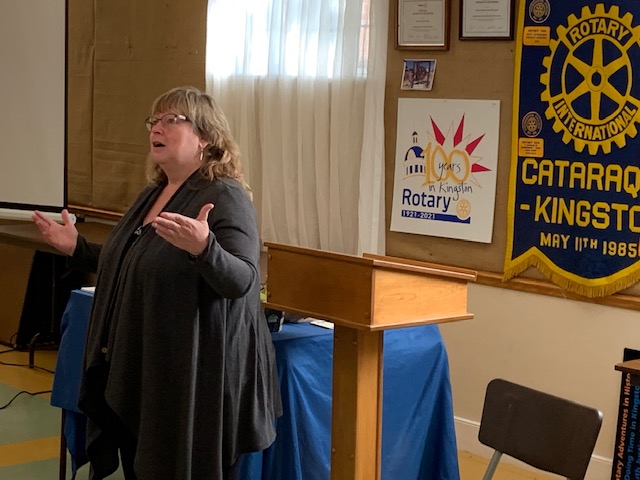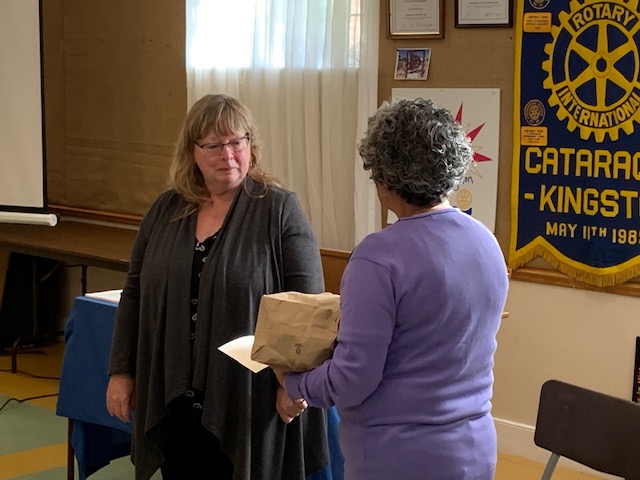John Farrow introduced today's speaker, Maggie McLaren, Director of Dawn House. Maggie has been with Dawn House for 6 years, and ran into John this summer, and was invited to come and give an update on an organization has supported in the past.
Maggie feels she was called to the position because the ad kept coming in through the fax machine at her former job every so often. After several times she had to apply. Dawn House has been around since 1986, in response to a housing and homelessness crisis in Kingston. Many women with children who were homeless with children lost those children to CAS. The Sisters of Providence started Dawn House with seed money, and the goal was to prevent homeless women from losing their children. The role changed in the 90's and 2000's to help disadvantaged women from Kingston, many of whom had mental health and addiction issues. Dawn House has since had a passion for working with the most challenged women. Then in 2015, a new city housing policy concentrating on permanent housing over shelters came into effect. This policy has not achieved it's goals (a five-year review is coming up), and the homelessness problem for women especially is worse. We don't see homeless women as much because they try to be invisible for personal safety reasons. Many homeless women sleep during the day and seek other shelters during the night, or they stay in an unsafe situation because there's no alternative.
The first shelter to lose funding in 2015 was the women's shelter, as the city wanted co-ed shelters, which doesn't work for women who have been abused or harassed. Dawn House then sold their Victoria Street property and bought the former Bayridge Medical Centre building on Bayridge Drive. This was a big risk but allowed Dawn House to continue to provide permanent housing, supportive housing, and transitional housing. Of course the goal is to get women into market housing, which is next to impossible with rates in Kingston, although the city is trying to address the issue. So Dawn house now has nine apartments, a seven bed transitional shelter, and one emergency bed. They are also trying to develop other housing options, because they continually get calls from other agencies looking for space. Dawn House receives no government assistance, getting their money from rents in the apartments, and from charging very low fees for Wi-Fi and laundry. Much of the money comes from grants, and they are constantly applying for new grants, especially now since a two year Trillium Grant is almost up.
Maggie shared some stories of women who have accessed Dawn House for years. One was a trafficking victim who was abused and had a daughter taken away. Her appearance and mannerisms led the staff to suspect a acquired brain injury. She was in the new transitional beds in 2017, and moved to an apartment. She was using drugs to deal with trauma, and Dawn House helped her get a place in KGH for an evaluation. A diagnosis of a rare condition that makes people actually believe they are dead followed. Meds helped stabilize her mental health, and with support the changes have been dramatic. She now cooks, cleans, and helps around the building, changed her appearance, and has become a whole new person according to Maggie.
Another women came in in 2017 as well with major anxiety because of a home invasion while living in the Niagara area. She was attacked by a man in the building she worked in, and was terrified whenever a man was in the facility. With help she is now able to leave the building or backyard, and continues to make progress.
Dawn House wants to move women from transitional housing after a year maximum, with help to find community housing. Others need to stay longer, like a woman who was released from prison after ten years. She resided at Dawn House but moved to an apartment with a roommate this June. She continues to receive mental health support and is off medication that she receive in prison to keep her docile (a common theme for released prisoners). There are many more stories that show just how important the work of Dawn House is. They serve the disabled, seniors, and more.
They main goal is to get women out of the homelessness cycle of shelter to shelter, to build a meaningful life, and recover from whatever took them down the road of homelessness. The common thread seems to be loneliness - lack of family, lack of comradeship, lack of supports.
In answer to questions, Maggie answered that one goal of the new fundraising is to open another facility, and the other is to provide funds for programming, to avoid funding shortages. Also, Dawn House works with 16 to 17 women at a time, and have 35 applications that are active. There were also 35 phone calls received in August from women looking for help. Mental health assistance is always a challenge, especially with changes to Addictions and Mental Health KFLA which resulted in Kingston losing a psychiatrist. Dawn House does help its residents manage their medication and keep their various appointments to help them make progress.
Perhaps the most important statement that Maggie made about Dawn House is that they never give up on the women they serve, no matter how long they help them and no matter who else gives up on them. President Ana thanked Maggie for a great presentation with the traditional loaf of bread.



